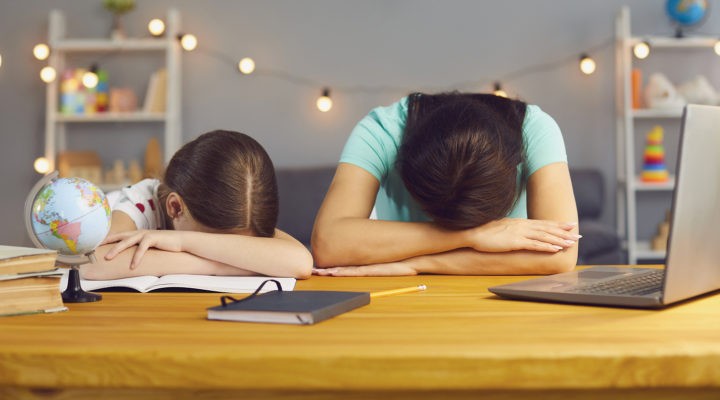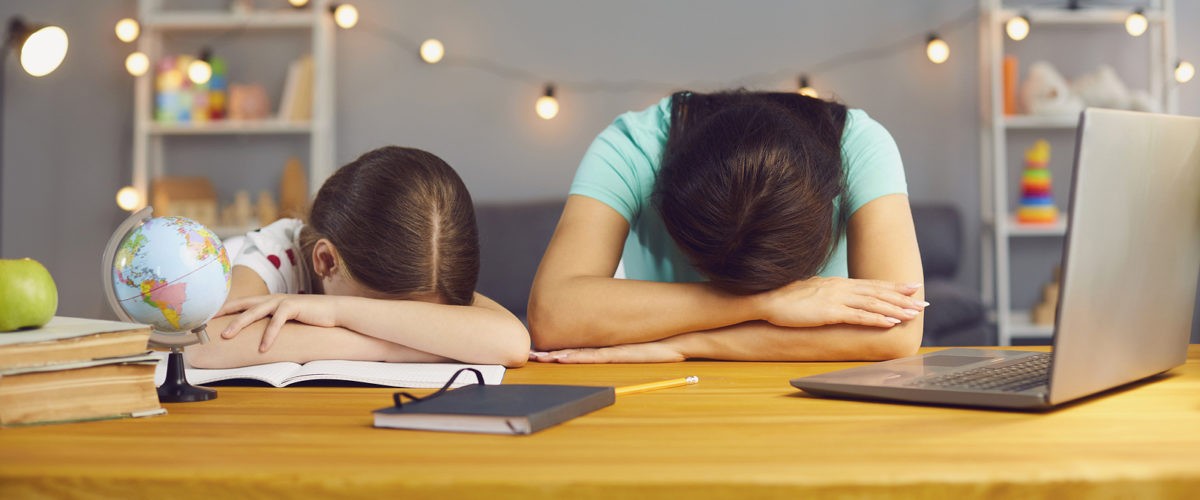Here’s the thing: The parents are not all right.
We’ve been at this unprecedented pandemic-parenting for more than five months, and there is no visible nightlight at the end of this dark and uncertain tunnel.
For years, my 6-year-old daughter has slept through the night in her bed. This is no longer the case. She cries when we tuck her in as she tells us she’s scared and unable to fall asleep. I rub her back, or we read an extra book or sing an extra song. Sometimes she cries herself to sleep. Every night around 3:00, she makes her way across the hall and surrenders to the safe cocoon of her Frozen sleeping bag on the floor beside my bed, and there she sleeps the rest of the night.

Christy Edwards
Other children are experiencing fits of rage and are expressing their emotion by breaking things and screaming. Some are regressing several years in potty training or latching back onto a pacifier. Many don’t want to be away from their parents at all and feel safe and secure only when physically present with mom or dad. Depression and anxiety are creeping into their lives through the cracks of shifting schedules, isolation and layers of grief that they struggle to express verbally.
Every parent I know is exhausted and overwhelmed. I realize most every person is also exhausted and overwhelmed, and while the parent perspective does not diminish the perspective of others, it’s different.
Don’t be fooled by how it appears on Facebook or Instagram. That is only part of the story. Be aware that we are trying to care for our own wavering mental and emotional health and at the same time ensure that our children feel safe, loved and cared for as we observe the changes COVID is wreaking on their personalities. Add on full-time jobs (that we are grateful for), household responsibilities, the lack of help due to social distancing, children who have special needs, economic stress, and the impending doom and probability of no face-to-face school in the fall, and parents are wondering how we are supposed to do this.
We were not created to parent in isolation. The African proverb, “It takes a village to raise a child,” is as true today as it was six months ago. We, the parents, need our village. We need you.
“We, the parents, need our village. We need you.”
When I walk into a patient’s room, I introduce myself to the child’s parents and often say: “I’m Christy. I’m one of the hospital chaplains, and I’m here for emotional support. What you’re doing is not easy, and I’m here to support you so you can best support your child during this difficult time.” As exhausted and overwhelmed parents around the country do their best to care for the physical, emotional, spiritual, mental and psychological needs of our children, we feel like we are one wave away from being washed into the sea of anxiety.
What we need:
- We need you to know we are maxed out. We know your intentions are good, but please don’t tell us things you think we “should” be doing. Many of us feel we are failing in several areas, and this “should” language only makes us feel worse.
- We need your encouragement. When I was training for a marathon, I mapped my long runs around my friends’ houses. At mile 7, 11 and 14, I would stop for water on a porch and often was greeted by sidewalk chalk messages telling me, “You can do it!,” “You are strong!,” “Way to go!” These simple messages taught me the importance of simple, encouraging words when they are most needed. Think of the parents in your life and send them a text or letter letting them know you see them and are cheering them on.
- We need you to find a different audience to talk about how bored you are. One friend of mine said, “If I hear one more person complain about how many puzzles they’ve worked, I’m going to lose it.” All feelings are valid, but it is important to think of your audience. Many parents daydream about being bored of puzzles, books and Netflix — until this daydream is interrupted by a child who needs another snack. During these pandemic days, boredom is a luxury parents of young children will not experience.
- We need you to know that we love our children. We are exhausted and overwhelmed and terrified of virtual learning, and we also love our kids and are grateful for this extra time we have with them. At the same time, we would like to sit in a dark room and stare at a TV for 17 days — alone.
- We need you to know that we recognize the importance of practicing self-care and are trying to scrape the minutes together but don’t know how to make the hours add up. Between my full-time job, my husband’s full-time job, working with three kids who all need help with school, helping my son who has special needs, and laundry and grocery shopping, I know I need to take care of myself, but when? How? This is where I wonder how those who are bored might find purpose and meaning in helping worn-out parents. Can you mow a lawn? Deliver a meal? Drop a coffee card by, because we need caffeine by the gallon right now?
- We need your help with school. How many retired educators are out there who could offer their services to tutor a child who is struggling in a particular subject? Could you Zoom with a child once a week or meet outside and masked? Can our churches put together a list of retired teachers who have time and are willing to help parents figure out a schedule for multiple children or offer helpful suggestions on how to make it all work? Are there retired educators who are skilled in helping children who have special needs who can support these families in your church?
- We need reminders that we are not alone. Every morning when I wake up and see my daughter in her sleeping bag by my bed, I realize her biggest fear isn’t the dark. Her greatest fear is being alone in the dark. Knowing you aren’t alone is vital. For all of us.
Christy Edwards is a board-certified pediatric hospital chaplain who lives in Liberty, Mo., with her husband, Jason, and their three children.
Related articles:
Three ways the church can support public schools in the era of COVID-19


